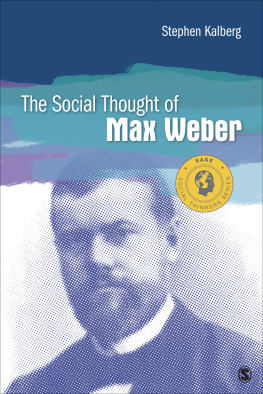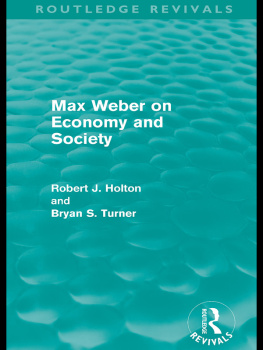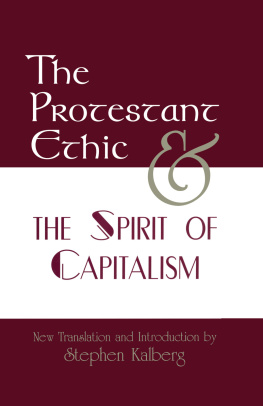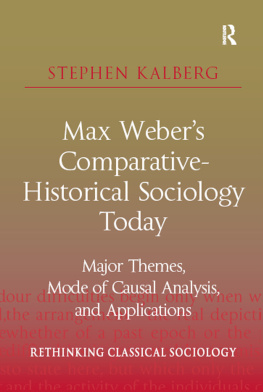Max Webers Sociology of Civilizations
This volume examines civilizations through the broad lens articulated by the works of Max Weber. In focusing upon his comparative-historical mode of analysis and his causal explanations for the sources, contours, and trajectories of civilizations, this study reconstructs Webers sociology in a manner that provides clear guidelines to researchers seeking to investigate civilizations systematically. Through detailed interpretations of the Wests unique development from Antiquity to the Modern era, precise comparisons to the long-range and singular pathways taken by China and India, and careful demarcations of the particular rationalisms of several civilizations, the author addresses Webers powerful model-building on the one hand and his opposition to organic holism and structural presuppositions on the other hand. Both a broad-ranging conceptual framework and case-based empirical investigations are pivotal to Weber. His research strategy emphasizes further the subjective meanings of actors East and West and the deep cultural origins of groups. Finally, this volume masterfully conveys Webers contextual and multi-causal methodology rooted in a tight interweaving of the present with the past. Max Webers Sociology of Civilizations: A Reconstruction will appeal to comparative sociologists and historians, as well as to theorists of all persuasions. The social scientist pursuing a cross-civilizational agenda will here discover the distinct contribution of Webers interpretive understanding procedures to the now-essential field of civilizational analysis.
Stephen Kalberg is Professor of Sociology Emeritus at Boston University and Local Affiliate of the Center for European Studies, Harvard University, USA. He is the author of Max Webers Comparative-Historical Sociology; The Social Thought of Max Weber; Searching for the Spirit of American Democracy: Max Webers Analysis of a Unique Political Culture; and Max Webers Comparative-Historical Sociology Today. He is also the editor of Max Weber: Readings and Commentary on Modernity, and the translator of Webers The Protestant Ethic and the Spirit of Capitalism.
Routledge Studies in Social and Political Thought
The Individual After Modernity: A Sociological Perspective
Mira Marody
The Politics of Well-Being
Towards a More Ethical World
Anthony M. Clohesy
From Hitler to Codreanu
The Ideology of Fascist Leaders
Carlos Manuel Martins
The Fascist Temptation
Creating a Political Community of Experience
David Ohana
Accumulating Capital Today
Contemporary Strategies of Profit and Dispossessive Policies
Marlne Benquet and Tho Bourgeron
Critical Rationalism and the Theory of Society
Critical Rationalism and the Open Society Volume 1
Masoud Mohammadi Alamuti
Functionalist Construction Work in Social Science
The Lost Heritage
Peter Sohlberg
Critical Theory and New Materialisms
Hartmut Rosa, Christoph Henning and Arthur Bueno
Max Webers Sociology of Civilizations: A Reconstruction
Stephen Kalberg
For a full list of titles in this series, please visit: www.routledge.com/series/RSSPT
First published 2021
by Routledge
2 Park Square, Milton Park, Abingdon, Oxon OX14 4RN
and by Routledge
605 Third Avenue, New York, NY 10158
Routledge is an imprint of the Taylor & Francis Group, an informa business
2021 Stephen Kalberg
The right of Stephen Kalberg to be identified as author of this work has been asserted by him in accordance with sections 77 and 78 of the Copyright, Designs and Patents Act 1988.
All rights reserved. No part of this book may be reprinted or reproduced or utilised in any form or by any electronic, mechanical, or other means, now known or hereafter invented, including photocopying and recording, or in any information storage or retrieval system, without permission in writing from the publishers.
Trademark notice: Product or corporate names may be trademarks or registered trademarks, and are used only for identification and explanation without intent to infringe.
British Library Cataloguing-in-Publication Data
A catalogue record for this book is available from the British Library
Library of Congress Cataloging-in-Publication Data
Names: Kalberg, Stephen, author.
Title: Max Webers sociology of civilizations : a reconstruction / Stephen Kalberg.
Description: Abingdon, Oxon ; New York, NY : Routledge, 2021. |
Series: Routledge studies in social and political thought | Includes bibliographical references and index.
Identifiers: LCCN 2021004613 (print) | LCCN 2021004614 (ebook) | ISBN 9780367497279 (hardback) | ISBN 9780367497286 (paperback) | ISBN 9781003047186 (ebook)
Subjects: LCSH: Weber, Max, 18641920. | SociologyPhilosophy. | CivilizationPhilosophy.
Classification: LCC HM479.W42 K3723 2021 (print) | LCC HM479.W42 (ebook) | DDC 301.01dc23
LC record available at https://lccn.loc.gov/2021004613
LC ebook record available at https://lccn.loc.gov/2021004614
ISBN: 9780367497279 (hbk)
ISBN: 9780367497286 (pbk)
ISBN: 9781003047186 (ebk)
Typeset in Bembo
by codeMantra
For Gayane
We are cultural beings, endowed with the capacity and the will to adopt a deliberate position with respect to the world, and to bestow meaning upon it. Whatever this meaning may be, it will become the basis on which we are, in our lives, led to judge certain phenomena of human existence in common and to adopt a (positive or negative) position with respect to them because we regard them as significant. (Obj, p. 119; emphasis original; translation altered)
Everyattempt at explanation, recognizing the fundamental significance of the economy, must above all take account of economic conditions. However, the opposite line of causation should not be neglected if only because the origins of economic rationalism depend not only on an advanced development of technology and law but also on the capacity and disposition of persons to organize their lives in a practical-rational manner. (PR, p. 246; translation altered)
Economic interests were not the exclusive, or even the primary, causal powers in the rise of [a stratum of professionally-trained jurists] to importance. Moreover, economic interests did not of themselves create this type of (rational) law. Rather, entirely different powers were active in respect to this development. And why then did capitalist interests not call forth this stratum of jurists and this type of law in China or India? (PR, p. 245; emphasis original; translation altered)
the [constructed model] is merely a technical aid which facilitates a more lucid arrangement and terminology. Yet, under certain conditions, a construction might mean more. For the rationality, owing to the logical or teleological consistency of an intellectual-theoretical or practical-ethical attitude, has and always has been very strongly visible, however limited and fragile it has been in the face of other powers of historical life. (IR, p. 324; translation altered)
We live today in the Global Age. Social media communications and open market dynamics now transcend all boundaries in pervasive ways. Cross-national networks of commerce and technology expand without respect to geographical limitations; varieties of subcultures artistic, literary, scholarly, and sports banish borders. International news arrives daily from multiple sources. Our mind-set is increasingly believed to be cosmopolitan and many commentators insist that all persons, in both hemispheres, are global citizens (Fukuyama, 2011; Sachs, 2020).






